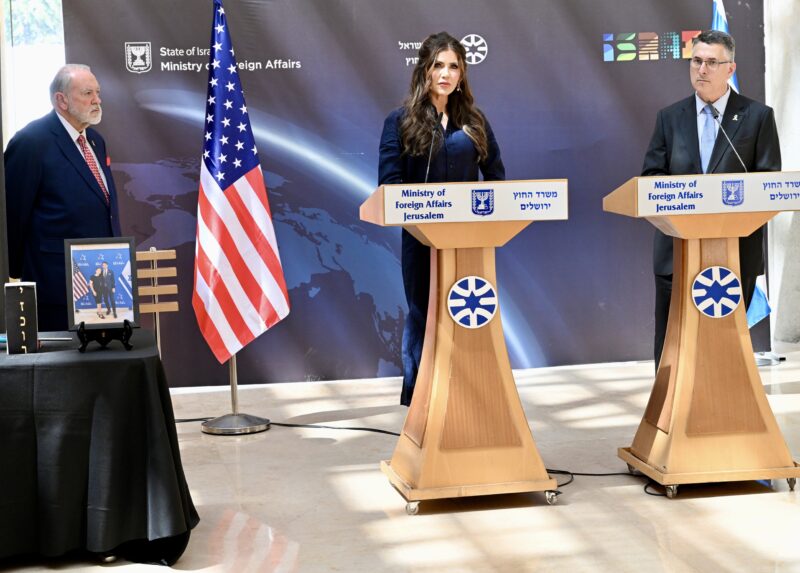Sen. Lankford says he’s very ‘optimistic’ about Lebanon’s future after visit
The Oklahoma senator also relayed a message from his trip to Iraq that Iran is not budging on its insistence on maintaining nuclear enrichment capacity

Andrew Harnik/Getty Images
Sen. James Lankford (R-OK) speaks during a news conference on Capitol Hill on May 1, 2024 in Washington, DC.
Following a visit to the Middle East, Sen. James Lankford (R-OK) said he’s very “optimistic” about the future of Lebanon under its new government, describing the country’s leaders as serious about centralizing power and demilitarizing Hezbollah.
Lankford and Sen. Angus King (I-ME) traveled last week to Baghdad and Erbil in Iraq, Beirut and Amman, Jordan. Lankford continued on to Jerusalem while the Maine senator went on to Turkey.
Lankford, in an interview with Jewish Insider in his Senate office on Thursday, said that he also heard from Iraqi partners that Tehran is not budging on its commitment to uranium enrichment and that regional leaders are supportive of sanctions relief for Syria.
Lankford pointed to reforms in banking rules to help allow for international investment and concerted action by the Lebanese government and Lebanese Armed Forces against Hezbollah as reasons for optimism.
“The Lebanese Armed Forces and the president were very clear: ‘We will be the defender of Lebanon. There’s not two armies, there’s one army,’” Lankford said. “They are working to demilitarize Hezbollah and to be able to make sure that they are the one army … I think there’s real progress and real opportunity.”
He said the LAF has undertaken hundreds of operations to move into and take over Hezbollah strongholds — which he said had been confirmed by U.S. military leadership — and Lebanese leaders were clear that they plan to continue to advance, seize weapons in Palestinian refugee areas and ultimately move into the Beqaa Valley, where many Hezbollah fighters have fled.
“[Lebanese leaders] don’t want to be at war with Israel and they don’t want to have two militaries in their country,” Lankford emphasized. “They want to be Lebanon and have peaceful relationships with their neighbors.”
At the same time, he said that the prospect of normalization between Lebanon and Israel floated by some Trump administration officials appears further off. He said the issue came up in his discussions, but that Israel’s military presence inside Lebanon is a “sticking point” for Lebanon’s leadership.
“The Lebanese leadership is saying, for Israel, ‘We understand that you’re wanting to be able to have some leverage here to be able to get us to do our work. We are doing our work. This is our country, you need to back across the Blue Line,’” Lankford said, referring to the border between the Golan Heights and Lebanon. “What we all understand is that boundary, and they’re working to be able to solidify that. And I believe they’re very close.”
He said that on both the Israeli and Lebanese sides, officials volunteered their “overwhelming support” for Morgan Ortagus, the Trump administration’s deputy Middle East envoy, who sources said will depart her post soon. Lankford said that regional leaders viewed Ortagus as an “honest broker, someone who is legitimately working to try to get to a resolution in the area.”
He said that discussions about Iran’s nuclear program were a primary focus for many in the region, adding that he “heard loud and clear” from leaders in Iraq who have been in close contact with Tehran that Iran is not budging on its insistence on maintaining enrichment capacity.
“[Leaders in Iraq] said, ‘All they want is peaceful [enrichment] purposes and [Iran is] hopeful that they’re going to keep that and they’re hopeful for the negotiations,’” Lankford said. “And I just said, ‘I’m not in the negotiations but I could tell you, there’s not an interest in having a uranium enrichment program in Iran at all.’”
Asked about recent reports that the U.S. has put forward proposals that would allow Iran to continue enriching, either in an interim capacity or as part of a regional consortium, Lankford said that Iran’s centrifuges cannot continue operating.
He also said, in response to comments by Secretary of State Marco Rubio that Iranian proxy terrorism and ballistic missile development are not part of the ongoing talks, that the proxies and missiles are central to the U.S.’ issues with Iran, and “it all needs to be addressed.”
Lankford added that Iran cannot be allowed to continue developing a missile capable of delivering a nuclear weapon while it continues to enrich uranium.
“I can remember saying [in 2015] that the problem with JCPOA is that they can continue to do their weapons development towards a weapon that can deliver a nuclear weapon, while they have time to be able to [do] more study,” Lankford said. “So it provides them the two things they need, money and time, and they don’t have to slow down their weapons development.”
Lankford said that, throughout the region, he heard support for sanctions relief for the new leadership in Syria to allow the fledgling government a chance to coalesce.
“There’s also cautious skepticism about the new leadership there, to say they need to have a chance, but they need to pull together a government that respects the rights of the minority,” Lankford said. “Everybody was focused in on, how do you get a unified Syria so it’s not split up? With so much diversity in Syria, how do you actually make that work?”
He said he hadn’t discussed the prospect of sanctions relief directly with Israeli leaders, but said that Israeli leaders are very wary of Turkish influence in Syria, and of Ankara effectively attempting to annex the country.
“That’s a real threat if the Turks decide they’re just going to keep moving south and dominate that, the Israelis are not comfortable with that at all,” Lankford said. “Syria needs to be Syria, and not Turkey South, and the prime minister [Benjamin Netanyahu] was very, very clear about that.”
He said that the president of Iraq’s Kurdistan region, Nechirvan Barzani, said he’s encouraging Syrian Kurds to focus their attention on the new Syrian government in Damascus and on establishing themselves as “part of the new Syria, not a separate entity … and that’s not going to happen if they just stay to the east and don’t actually go engage with the new government.”
Lankford said Israeli leaders were “skeptical” that a ceasefire and hostage-release deal with Hamas, as pushed by the Trump administration, is achievable, and said Israeli leaders told him they plan to continue military operations until Hamas agrees to release the hostages, though he said all parties involved want to see a ceasefire and hostage release.
“[Hamas] could turn over the hostages at any moment and they’ve chosen not to do that, and so we’re going to go get our hostages,” he said, characterizing Israeli leaders’ position on the issue, adding that Hamas cannot remain in power.
He said that Israel is also focused on eliminating remaining Hamas fighters and weapons and said that Israel still has “a long way to go in the tunnels,” but is working to create “safe areas for people to live free of Hamas” and receive food aid.
The Gaza Humanitarian Foundation, the new U.S. and Israeli-backed aid delivery mechanism in Gaza, began operations while Lankford was in Israel, and he said that it was achieving its desired results in getting food to Palestinians free of Hamas control.







































